So, you’re thinking about moving your boat, and it feels a bit daunting, right? Well, don’t sweat it! This guide is going to steer you through the ins and outs of boat transportation. We’ll dish out all the essential info, pro tips, and insider advice you need to ensure your vessel gets from point A to B without a hitch.
Whether you’re a brand-new boat owner or an old salt, we’ve got you covered. Our mission is to make your boat transportation experience as smooth as a calm sea on a sunny day. So, buckle up and let’s dive in!
Boat Transportation: What You Need to Know
Hauling your boat from one place to another is a big deal. It needs more than just throwing a dart at a map and hitting the road. It’s about meticulously planning and executing each step, ensuring your prized possession – whether it’s a cozy fishing boat or a fancy yacht – reaches its destination safe and sound. This part of our guide lays out everything you need to know about boat transportation, from the types of vessels you can ship, factors to mull over before shipping, the costs, and the rules of the road.
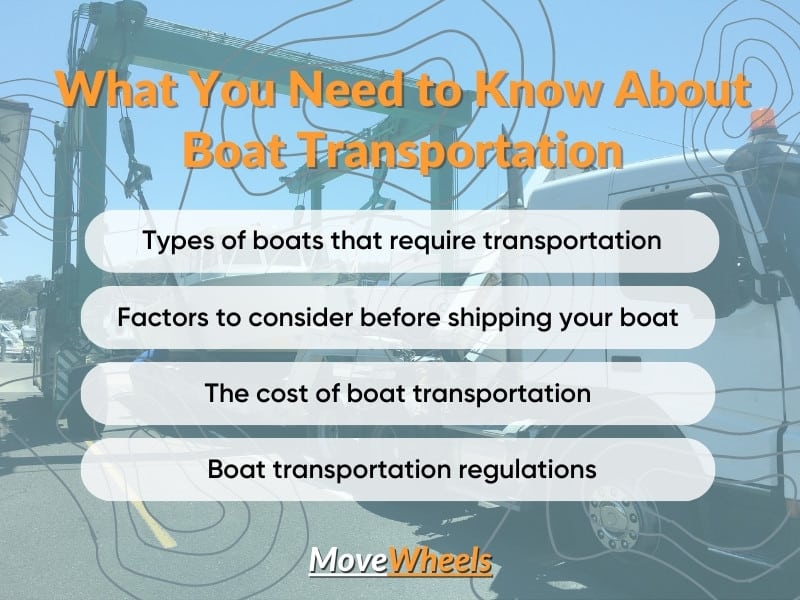
Types of boats that require transportation
Boat transportation services are versatile. They can handle everything from personal watercraft and pontoons, to sailboats and yachts. The size, weight, and shape of your boat are important – they dictate the type of transportation that’s used. Smaller boats might hitch a ride on open or enclosed trailers, while larger vessels could need a flatbed truck. And if you’re thinking international, a cargo ship might be your best bet.
Factors to consider before shipping your boat
When you’re gearing up to ship your boat, several factors come into play. The distance you’re moving, the size and weight of your boat, and the type of transport you choose all affect the final cost. Time of year and weather conditions are also important considerations, along with any special permits or regulations. Do your homework, compare boat transportation services, and make sure you pick a reputable, experienced company.
The cost of boat transportation
Transportation costs can vary widely, depending on several variables: how far you’re moving, the size and weight of your boat, and the type of transport used. Most boat transportation services will give you a tailored quote based on your specific needs. Don’t jump at the first quote you get – shop around and make sure you’re getting a fair shake.
Boat transportation regulations
Transporting a boat isn’t a lawless endeavor – it’s regulated by federal and state rules to ensure safety on our roads and waterways. Depending on your boat’s size and type, you might need permits or licenses. Stay ahead of the curve and familiarize yourself with the rules and regulations that apply to your situation to avoid any nasty surprises like legal issues or fines.
In a nutshell, boat transportation is a specialized service that calls for skill and know-how. Make sure you do your homework, compare boat transportation services, and understand what goes into the cost. Stay on top of regulations and keep everything above board. With the right prep and planning, transporting your boat can be as breezy as a day out on the water.
How to Prepare Your Boat for Transport: Expert Tips
Preparing your boat for transportation is an important step to ensure that it arrives at its destination safely and in excellent condition. In this section, we will provide you with expert tips on how to prepare your boat for transport, including cleaning and maintenance, removing personal items and accessories, securing loose items and equipment, and properly winterizing the boat.
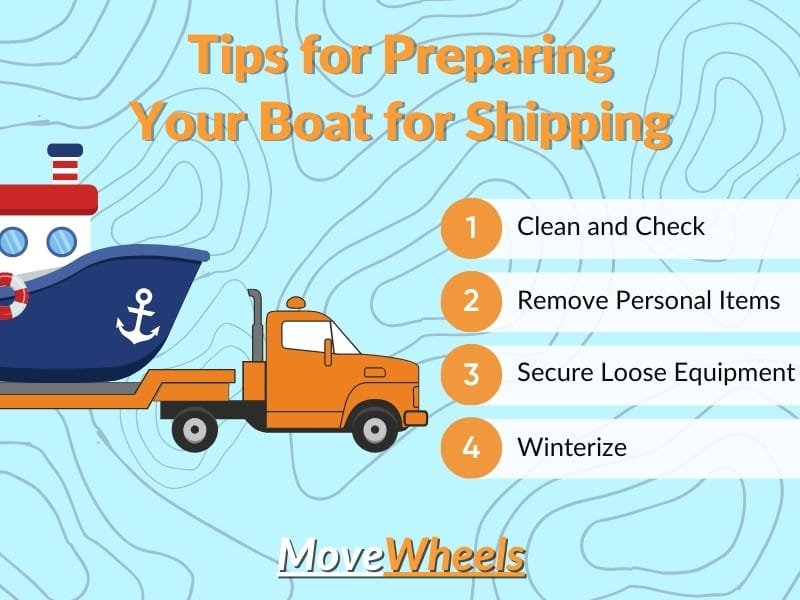
In short, getting your boat ready for transportation isn’t just about slapping on a “fragile” sticker. It requires planning, a careful hand, and attention to detail. It’s about cleaning and maintaining your boat, taking personal items off board, securing loose equipment, and prepping your boat for winter if necessary. With these expert tips under your belt, you can rest easy knowing your boat is prepped and ready for its voyage, minimizing the risk of damage during transport.
Unveiling Boat Transportation Secrets:
What the Process Looks Like
Shipping your boat is no small task. Let’s unravel the process and sail through the ins and outs of boat transportation, touching on key areas such as choosing the right transport method, finding a trustworthy boat shipping service, preparing for moving day, and the loading and unloading process.
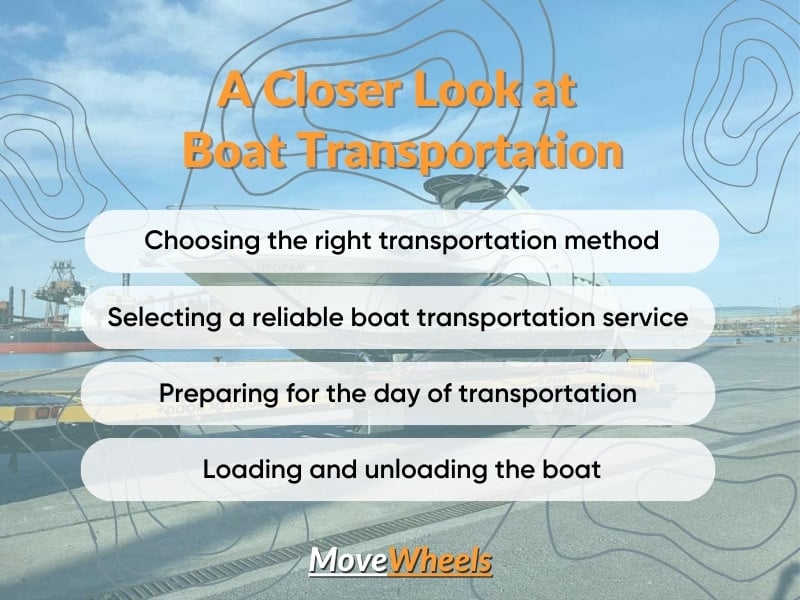
Boat transportation is about choosing the right transport method, selecting a dependable shipping service, prepping for transportation day, and understanding the loading and unloading process. With these insights, you’re well-equipped to ensure your boat’s journey is smooth sailing.
Post-Transport Tips: How to Ensure Your Boat is in Great Shape
Once your boat has arrived at its new location, there are key steps to ensure it’s in top shape and ready for action. Here’s a rundown of things to check post-transport.
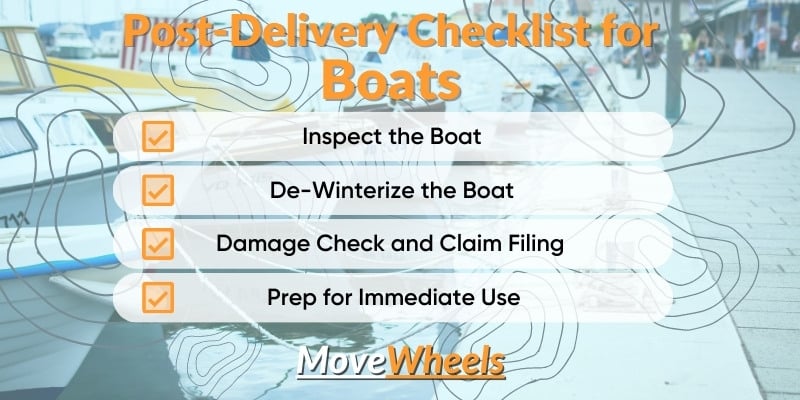
Post-transport care involves inspecting your boat, de-winterizing if necessary, checking for damage, and prepping for immediate use. By taking these steps, you’ll ensure that your boat is seaworthy and ready for adventure.
Questions to Ask Your Boat Transportation Service
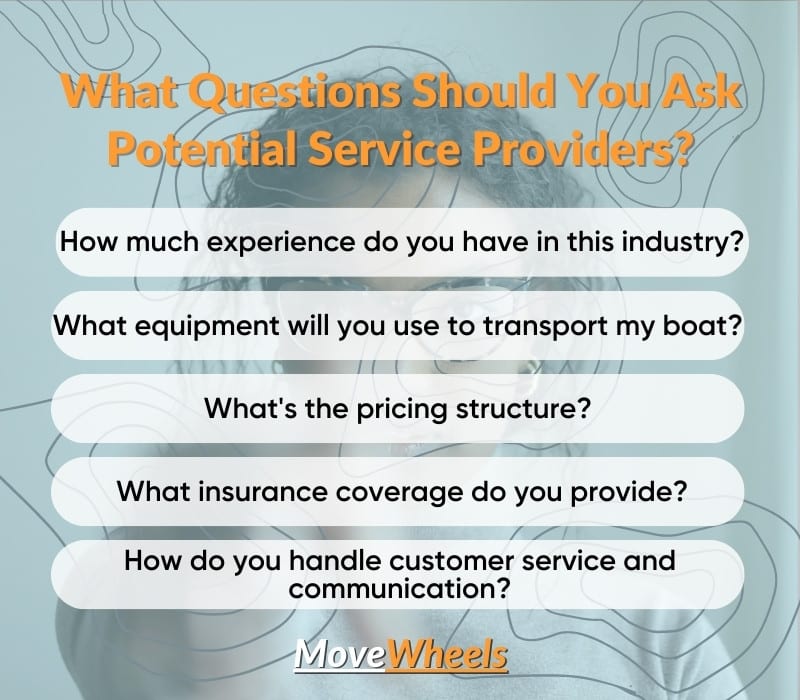
When it comes to moving your cherished vessel, you want to ensure you’re entrusting it to a professional, reliable boat transportation service. This requires asking the right questions before signing a contract. Here are some key questions you should ask potential service providers:
How much experience do you have in this industry?
A company’s longevity and successful track record in the business can speak volumes about their professionalism and reliability. Inquire about their years of experience and their history of handling boats similar to yours.
What equipment will you use to transport my boat?
Depending on the size and type of your boat, as well as the distance to be covered, the service may need specific equipment such as trailers, flatbed trucks, or even cargo ships. Understanding what will be used helps you gauge the company’s capability.
What’s the pricing structure?
Understanding the cost is vital. Ask about their pricing method and what factors could potentially affect the cost, such as distance, size, and weight of the boat. Also, clarify what exactly is included in the quote.
What insurance coverage do you provide?
Boat transportation services should have robust insurance to protect your boat during transit. Find out the extent of their coverage, including what situations it covers and what it doesn’t.
How do you handle customer service and communication?
Smooth communication is key to a stress-free transport experience. Ask about how they will keep you updated during the transportation process and how they handle potential issues or concerns.
Asking these essential questions will help you evaluate potential boat transportation services, enabling you to choose the best fit for your needs. This checklist will guide you in making an informed decision for a smooth, worry-free boat transport experience.
Moving a boat is a unique endeavor that requires careful planning, informed decision-making, and attention to detail. From understanding the types of boats that need transportation to effectively preparing your vessel for transport, every step of the journey demands thoroughness. Knowing how to select a dependable transportation service, and being prepared to evaluate their process through key questions, is pivotal for a successful outcome. Lastly, the steps you take after the boat has been transported play a crucial role in ensuring your boat’s condition and immediate usability.
Boat transportation might seem daunting at first, but with this comprehensive guide in your hands, it doesn’t have to be. Armed with the right knowledge and resources, you can ensure a smooth and safe transportation process, ensuring your vessel is ready for the next voyage. Here’s to safe travels and calm waters ahead!
FAQ
Can I transport my boat myself?
While you can technically transport your boat yourself, it requires specialized knowledge, equipment, and potentially permits. Mistakes can lead to serious damage or legal issues. For these reasons, most people choose to hire professional boat transportation services.
Can I pack personal items in my boat during transportation?
It’s generally recommended to remove all personal items from your boat during transportation. These items can get damaged or lost during transport, and they may also affect the weight and balance of the boat.
Can you transport a boat with a full fuel tank?
Typically, it’s advised to empty the fuel tank to about 1/4th of its capacity for safety reasons and to reduce the overall weight of the boat during transportation.
What should I do if my boat is damaged during transportation?
If your boat is damaged during transportation, document the damage with photographs and contact the transportation service immediately. They should have insurance to cover any damages that occur during transport.
Is there a particular time of the year that’s best for boat transportation?
The best time to transport your boat often depends on the weather conditions and your specific needs. However, the offseasons in spring and fall often provide the best rates and availability.
Is there a size limit for boats that can be transported overland?
While there are limitations for overland boat transport due to restrictions on road widths, bridge heights, and weight restrictions, most standard leisure boats can be transported overland. For oversized boats, specialized routing and permits may be required.
Similiar Articles
- Is Your RV Ready for Spring Travel? Pre-Transport Checklist
- Open Vehicle Transport: How it Works and How Much It Costs in 2024
- Secure and Sophisticated: Your Complete Guide to Enclosed Auto Transport with MoveWheels
- New Year, New Motorcycle: Top Motorcycles` Choice among Americans in 2024
- How Vehicle Type Impacts Transportation Costs: From Cars to Heavy Equipment
- Why You Shouldn’t Put Personal Items in Your Car During Shipping
- Top 5 Advices for Shipping a Classic Car
- Choosing the Right Trailer for Heavy Equipment Transport
- The Mom’s Guide to Buying a Car
- Smooth Sailing: A Comprehensive Guide to Boat Transportation
